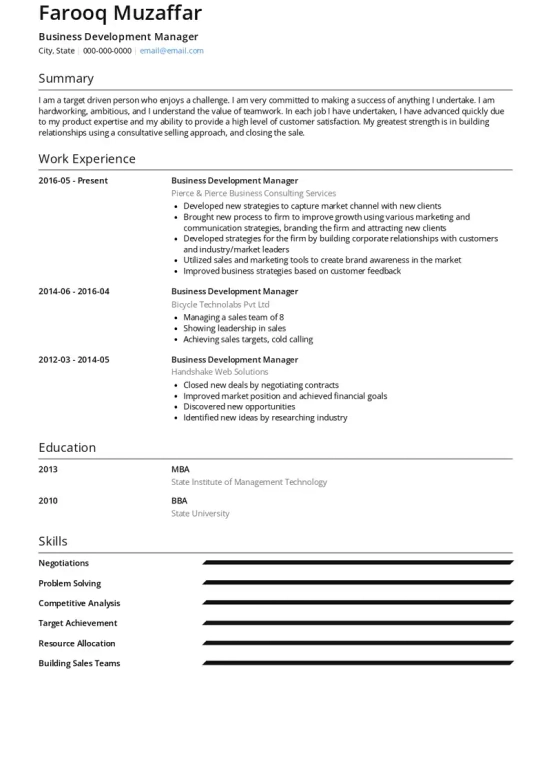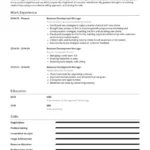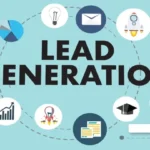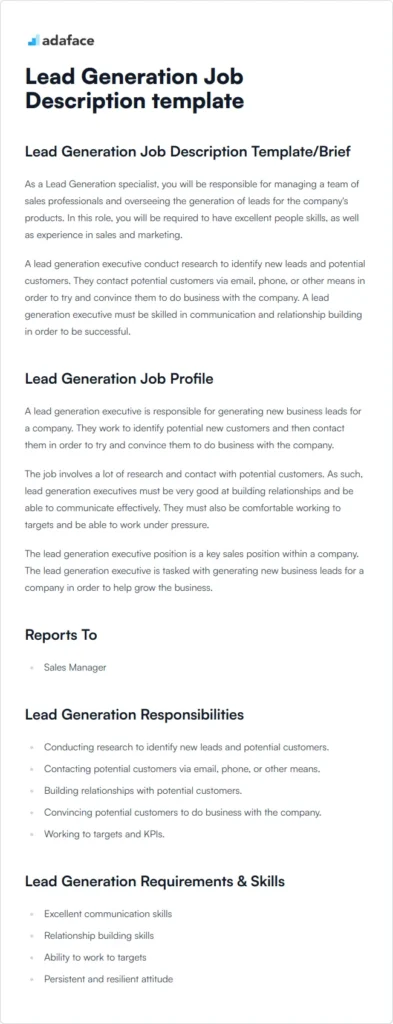
Lead generation is crucial for business growth. It helps attract potential customers.
Understanding lead generation roles can enhance your marketing efforts. These roles involve identifying and nurturing potential clients, turning them into loyal customers. They require specialized skills, ensuring a steady flow of leads. Knowing who does what in lead generation can optimize your strategy.
This blog post explores the key roles in lead generation. From marketers to sales teams, each role plays a vital part. Discover how these roles work together. Improve your lead generation process. Stay ahead in the competitive market. Read on to learn about the essential roles in lead generation.
Introduction To Lead Generation
Lead generation is the process of attracting potential customers. These customers show interest in your products or services. Every business needs new leads to grow. Without new leads, growth slows down. Lead generation helps find new customers. It is a key part of any business strategy.
Importance Of Lead Generation
Lead generation is vital for business success. It helps find potential customers. These customers can become loyal clients. More leads mean more sales opportunities. Consistent lead generation keeps the sales pipeline full. It ensures business growth and sustainability. Without lead generation, a business may struggle.
Overview Of Lead Generation Roles
Several roles are involved in lead generation. Each role has its own tasks. Marketing teams create content. This content attracts potential leads. Sales teams follow up with leads. They convert these leads into customers. Analysts track and measure lead generation efforts. They ensure strategies are working. Each role is important for successful lead generation.
Key Roles In Lead Generation
Lead generation is crucial for any business aiming to grow. It involves attracting and converting prospects into customers. Various roles contribute to this process, ensuring a steady flow of leads. Let’s explore the key roles in lead generation.
Lead Generation Specialist
A Lead Generation Specialist focuses on finding potential customers. They use various methods to identify and attract leads. This role requires a deep understanding of the target audience. Specialists often use tools like CRM software to track leads. They also analyze data to improve lead quality and quantity.
Lead Generation Specialists create strategies to engage potential customers. They use content marketing, social media, and email campaigns. Their goal is to generate interest and build relationships. They work closely with sales teams to ensure leads are nurtured.
Marketing Coordinator
A Marketing Coordinator supports the lead generation process. They help plan and execute marketing campaigns. This role involves coordinating various marketing activities. Marketing Coordinators ensure campaigns run smoothly and meet deadlines.
They also track campaign performance and report results. This helps in understanding what works and what doesn’t. Marketing Coordinators often manage content creation and distribution. They ensure the right message reaches the right audience.
Both roles are essential in driving business growth. They work together to attract and convert leads. Understanding these roles can help improve your lead generation efforts.
Essential Skills For Lead Generation
Lead generation is a critical aspect of any business. It involves attracting and converting prospects into potential customers. To succeed in this role, certain essential skills are necessary. These skills help in reaching out to the right audience and converting them effectively.
Communication Skills
Effective communication is vital in lead generation. Clear and concise messages engage prospects better. Understanding the audience’s needs is key. This allows for tailored communication. Good listening skills also play a part. They help in understanding potential clients’ concerns. This builds trust and rapport. Both verbal and written communication skills are important. Crafting compelling emails and messages can drive engagement. Networking skills also fall under communication. Building connections and relationships is crucial.
Analytical Abilities
Analytical skills are essential for lead generation. They help in understanding data and trends. This can inform decision-making. Analyzing metrics like conversion rates is important. This can highlight what strategies work best. Problem-solving skills are also needed. They help in addressing any issues that arise. Data interpretation skills aid in understanding market behavior. This can lead to better targeting of potential leads. Analyzing competitors can provide insights too. This helps in staying ahead in the game.

Credit: manditsolutions.com
Technical Proficiency
Technical proficiency is crucial in lead generation roles. This skill set enables professionals to efficiently manage and optimize the tools and platforms that drive successful campaigns. Understanding and leveraging these technologies can significantly enhance lead acquisition and nurturing processes.
Crm Software
Customer Relationship Management (CRM) software is vital for tracking and managing leads. It helps organize information, making it easy to follow up and convert leads. CRMs like Salesforce and HubSpot streamline communication and improve efficiency. They provide valuable insights through data analytics. This allows for better decision-making and strategy adjustments. Using CRM software ensures that no lead is lost and every opportunity is maximized.
Marketing Automation Tools
Marketing automation tools are essential for scaling lead generation efforts. These tools automate repetitive tasks like email campaigns and social media posts. Platforms like Mailchimp and Marketo save time and maintain consistent engagement with leads. Automation also helps in personalizing messages based on lead behavior. This increases the chances of conversion. Effective use of marketing automation tools can significantly boost lead generation efficiency and outcomes.
Content Creation
Content creation plays a crucial role in lead generation. Quality content attracts and engages potential customers. It helps build trust and authority. By consistently delivering valuable content, businesses can convert leads into customers. Let’s dive into two key aspects of content creation: effective copywriting and visual content design.
Effective Copywriting
Effective copywriting grabs attention and encourages action. Good copy is clear and concise. It speaks directly to the reader. It addresses their needs and pain points. Use persuasive language to highlight benefits. Include a call-to-action to guide the reader. Regularly updating content can keep your audience engaged.
Visual Content Design
Visual content design is equally important. People are naturally drawn to visuals. Images, videos, and infographics make content more engaging. They help convey complex information quickly. Good design should be clear and professional. Ensure that visuals align with your brand identity. High-quality images and videos can increase engagement and shares.
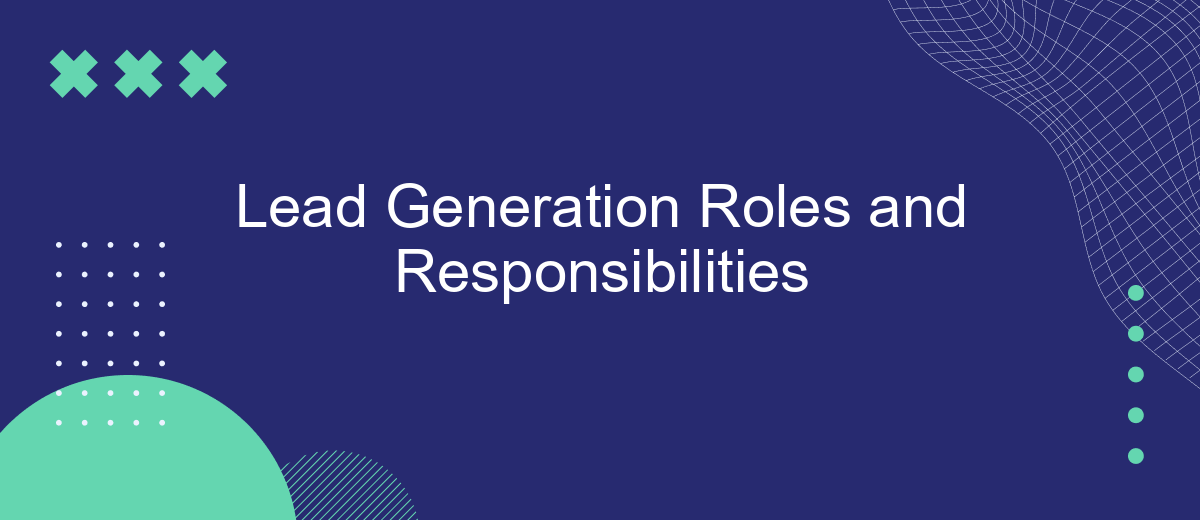
Credit: savemyleads.com
Social Media Management
Social Media Management plays a crucial role in lead generation. It involves creating, scheduling, and analyzing content posted on social platforms. This helps businesses connect with their audience and attract potential leads.
Engagement Strategies
Effective engagement strategies can significantly boost lead generation. Here are some key methods:
- Posting high-quality, relevant content
- Responding promptly to comments and messages
- Running interactive polls and surveys
- Collaborating with influencers
Engaging with your audience builds trust. Trust leads to more conversions.
Platform-specific Tactics
Different social media platforms require unique approaches. Here are some platform-specific tactics:
| Platform | Tactics |
|---|---|
| Use Facebook Ads, create engaging posts, and host live sessions | |
| Share high-quality visuals, use Stories, and leverage hashtags | |
| Publish articles, join groups, and connect with industry leaders | |
| Engage with trending topics, use concise tweets, and retweet relevant content |
Understanding each platform’s strengths can enhance your lead generation efforts. Tailor your strategy to fit each platform’s audience and features.
Data Analysis
Data analysis is vital for successful lead generation. It helps you understand what’s working and what needs improvement. This section will explore the role of data analysis in lead generation. We will cover tracking metrics and optimizing campaigns.
Tracking Metrics
Tracking metrics is essential for measuring success. Key metrics include lead conversion rate, cost per lead, and lead source. These metrics provide insights into your campaigns. They help identify which strategies generate the most leads. Regularly check these metrics to stay on track.
Optimizing Campaigns
Data analysis helps optimize campaigns. By studying metrics, you can find patterns and trends. This data tells you what works best. Adjust your strategies based on these insights. Test different approaches to see what works. Make data-driven decisions to improve results.
Credit: skale.so
Collaboration And Teamwork
Effective collaboration and teamwork are the backbones of successful lead generation efforts. By working together, teams can leverage each other’s strengths, address weaknesses, and achieve their shared goals. Let’s explore how lead generation teams can collaborate with other departments.
Working With Sales Teams
Lead generation teams must work closely with sales teams. This ensures that the leads generated are relevant and high-quality. Here are some ways they can collaborate:
- Regular Meetings: Schedule frequent meetings to discuss lead quality and feedback.
- Shared Goals: Set common objectives to align efforts and measure success.
- Communication Tools: Use tools like Slack or Trello for seamless communication.
Cross-departmental Coordination
Lead generation is not an isolated process. It needs the input and support of various departments. Here’s how coordination can be achieved:
| Department | Role in Lead Generation |
|---|---|
| Marketing | Create compelling content and campaigns that attract potential leads. |
| Customer Support | Provide insights from customer interactions to refine lead profiles. |
| Product Development | Offer details about product features that can attract specific leads. |
Coordination among departments ensures that the lead generation process is smooth and efficient. It also helps in creating a unified strategy that benefits the whole organization.
Continuous Learning
Continuous learning is crucial in lead generation roles. The digital landscape changes rapidly. Professionals need to keep up with new trends and skills. Staying updated and developing professionally helps in achieving better results.
Staying Updated With Trends
Staying updated with the latest trends is essential. Digital marketing evolves constantly. New tools and techniques emerge regularly. Following industry blogs, news, and forums helps. Attending webinars and conferences also provides insights. Networking with peers can share valuable knowledge.
Professional Development
Professional development enhances lead generation skills. Enroll in online courses or workshops. Certifications can add credibility. Learning new software or tools is beneficial. Join professional groups or associations. They offer resources and support. Seeking mentorship from experienced professionals can provide guidance. Regularly reviewing performance and feedback is important. It helps identify areas for improvement.
Conclusion
Lead generation roles are crucial for business growth. They help attract potential customers. Skilled professionals in these roles drive sales and boost revenue. Understanding each role’s responsibilities enhances team performance. Focus on improving your lead generation strategy. This ensures sustainable business success.
Invest in training and tools for your team. It makes a big difference. Keep refining your processes. Stay ahead in the competitive market. Lead generation is an ongoing effort. Consistency is key. Keep your goals clear. Track your progress regularly.
Happy lead generating!

